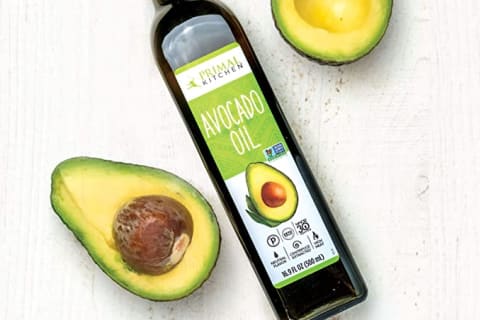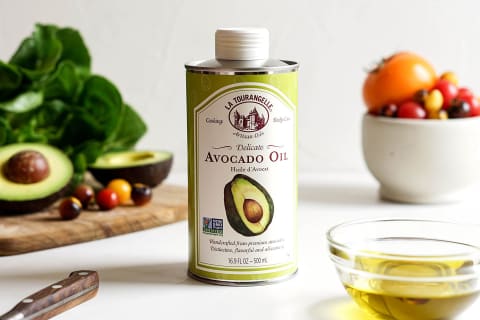7 Science-Backed Benefits of Avocado Oil + How To Find A High-Quality Option


Avocado oil is considered one of the healthiest cooking oils to use. But despite its growing popularity and availability on shelves, it’s important to choose your avocado oil wisely. So, what are the benefits of avocado oil and how can you find the best option at the store? Here’s what you need to know.
Advertisement
Benefits of avocado oil.
There are plenty of benefits of avocado oil that make it more nutritious than other cooking oils like seed oils. Here are some of the top perks:
It has a high smoke point.
The smoke point of cooking oil is the temperature at which the oil starts to burn and smoke. Once this happens, the oil begins to break down and create pro-inflammatory free radicals and low levels of acrolein, a carcinogenic compound. Regular exposure to acrolein has been associated with heart disease1, Alzheimer’s disease2, and more.
Avocado oil has a high smoke point compared to other oils, says Nisha Chellam, MD, a functional medicine doctor with Parsley Health. The smoke point is 480 degrees Fahrenheit for unrefined avocado oil and 520 degrees for refined avocado oil. That’s significantly higher than extra-virgin olive oil (350 degrees) and vegetable oil (400 degrees).
Advertisement
It may help with gut health.
Emerging research has shown that avocados can impact your gut microbiome. By association, avocado oil may have similar benefits, Chellam said.
In one 12-week study3, 163 people who had up to 175 grams of avocado (about one large 'cado) once a day found that those who ate the fruit had a more diverse range of gut bacteria compared to the control group. They also had lower amounts of bile acids in their feces, which can indicate that food is moving well through the stomach.
It may support good heart health.
Avocado oil is packed with heart-healthy oleic acid4, which is an omega-9 fatty acid and unsaturated fat. Research5 suggests that unsaturated fats may lower your risk of developing heart disease by lowering levels of LDL (“bad”) cholesterol and improving the ratio of total cholesterol to HDL (“good”) cholesterol. Avocado oil also has linoleic acid, which has been linked6 to a lower risk of heart disease.
Avocado oil falls under the category of liquid plant oil that is low in saturated fat, which is what the American Heart Association7 recommends cooking with for heart health.
Advertisement
It may help lower your cholesterol.
Avocado oil, packed with monounsaturated fats, can help lower cholesterol when it’s substituted for saturated fats, says Penny Kris-Etherton, PhD, RDN, LDN, FAHA, a professor of nutritional sciences at Penn State.
Avocado oil’s impact on cholesterol has been directly researched in several small studies. One crossover study8 in the Journal of Functional Foods had participants either eat a meal that featured 25 grams of butter or 25 grams of avocado oil. The participants had their blood drawn after each meal, and data showed that people who had avocado oil had lower levels of triglycerides, LDL (bad) cholesterol, and blood sugar compared with those who had butter.
It supports healthy eyesight.
Avocado oil is rich in lutein9, an antioxidant that’s critical for good eye health that the body cannot make on its own. Having enough lutein in your diet may reduce your risk of developing cataracts10 and macular degeneration, which are more common as you age, Chellam says. Lutein is also a powerful antioxidant that can neutralize free radicals and filter blue light, making them a type of "internal sunglasses11."
Advertisement
It nourishes your hair and skin.
Avocado oil’s fatty acids, along with vitamins A and E, can help support 12the health of your skin and hair. “One of the best beauty uses is when avocado oil is in facial and skin creams,” Chellam says. “It has carotenoids, which help with DNA repair, and vitamin E, which is very important for the flow of sebaceous glands to give you suppleness of the skin.”
Chellam recommends applying avocado oil directly to your skin to reap these benefits. You can also use it for your hair (read more about those benefits here.)
RELATED STORY: 4 DIY Avocado Face Mask Recipes For Dry, Dull Skin
It’s versatile for cooking.
Avocado oil can be used in a slew of dishes. “You can put it in salads, you can cook with it at higher temperatures, you can drizzle it over vegetables and roast them…it’s helpful for cooking,” Kris-Etherton says.
Dena Champion, an RD at The Ohio State University Wexner Medical Center, agrees. “Refined avocado oil is great for baking,” she adds.
Summary
Advertisement
Refined vs. unrefined avocado oil
Avocado oil can generally be broken into two groups: refined and unrefined. “Unrefined avocado oil contains chlorophyll and carotenoids, which give it a light green color,” Champion says. “It has a mild flavor and aroma that most find pleasing.” This oil, in general, has more phytochemicals than refined oil, Champion says.
With refined oil, “The refining process [uses a filter to] removes pigments, scent, and flavor, which creates an oil free of color and odor,” she adds.
Keep in mind, though, that refining avocado oil strips it of phytochemicals, including chlorophyll and carotenoids. “This is not to say refined avocado oil is bad for one's health,” says Champion. “It's still a great source of healthy monounsaturated fats.”
Depending on what you’re eating, though, you may prefer one over the other. “If you are baking cookies, you would not want the flavor of traditional avocado oil,” Champion points out. “Refined avocado oil also has a higher smoke point, which means you can heat it to very high temperatures before it burns.”
Summary
How does avocado oil compare to other oils?
Avocado oil is just one of several healthy plant oils. For comparison’s sake, here’s how it stacks up to other popular oils.
Avocado oil vs. coconut oil
Avocado oil has a higher smoke point than refined and unrefined coconut oil; 480 degrees Fahrenheit (unrefined) to 520 degrees (refined), compared to 350 degrees (unrefined) to 450 degrees (refined).
“Avocado oil has a healthier nutrient profile than coconut oil,” Champion says. “Coconut oil is high in saturated fats, whereas avocado oil is high in unsaturated fats.” Coconut oil is also solid at room temperature which can make cooking with it slightly more challenging than avocado oil, Kris-Etherton says.
Avocado oil vs. olive oil
While avocado oil hasn’t been studied as extensively as olive oil, Kris-Etherton says they have “similar health benefits.” Avocado oil has a higher smoke point than olive oil. Both oils are high in unsaturated fatty acids, Champion points out, and also contain health-promoting phytochemicals and antioxidants. So they both deserve a spot in your rotation.
“They’re both good for you, and it’s good to mix things up,” Kris-Etherton says.
How to use avocado oil
Here are just a few ways to use avocado oil every day:
- As a salad dressing base
- Drizzle over vegetables and roast them
- As a butter substitute in baking recipes
- Sprinkle it over fish that’s then cooked in the oven
- As a scalp treatment
It’s important to store your avocado oil properly. The oil should be stored away from light, so it’s best to put it in a cupboard or pantry, Kris-Etherton says. Once it’s opened, you can usually get about eight months out of the bottle before it goes bad, although it may last slightly longer in the fridge, she adds.
Side effects and downsides
Avocado has a high fat content13 (though they are healthy fats), so you should limit your intake if you're concerned about lipids. Research supports sticking to a tablespoon or less for healthy consumption of oils daily.
“A teaspoon of avocado oil has more than 100 calories4,” Chellam adds. “If you’re trying to lose weight, it’s important to be aware of that.” (Keep in mind, though, that the majority of plant-based oils like olive oil, grapeseed oil, and canola oil have similar calorie counts.)
It's also important to note that our macronutrient needs for fat should not be met with just oil. Champion says, “Dietary fat is important in a healthy diet, but plenty exists in whole foods such as nuts, seeds, and avocados.”
Shopping tips and buying sustainability
It can be difficult to find a high-quality, sustainably sourced avocado oil. UC Davis research14 found that 82% of avocado oil in the U.S. is either stale or mixed with other types of vegetable oils, like sunflower, safflower, and soybean.
Kris-Etherton recommends doing your research to buy from a company that practices responsible production and processing methods. It’s also a good idea to buy avocado oil that’s stored in a dark glass bottle, which blocks light and helps prevent the oil from oxidizing or going bad before its expiration date.
A few healthy avocado oil options
How to make your own avocado oil
If you want to go the DIY route, making your own avocado oil is fairly straightforward. “In general, the fruit is crushed and sometimes you crush the skin with the fruit,” Chellam says. That mixture is usually heated and the oil is extracted, she says.
Once the avocado is mushed and pulverized, the fat will float to the top, Kris-Etherton says. It’s similar to natural peanut butter, she explains—once you let it sit, the ingredients separate to reveal the oil.
But just because it's straightforward doesn't mean it's easy. It can be a very time-intensive process and can create a lot of food waste if you have no plans to use the rest of the fruit. “Think about a way of using the whole food,” Kris-Etherton advises.
Frequently Asked Questions
What is avocado oil good for?
Avocado oil is good for a lot of different things. It can be used in cooking and in beauty products (including DIY hair masks and skin treatments). Consider using it as a substitute for butter and other plant-based oils when cooking.
Is avocado healthier than olive oil?
Not necessarily. Avocado oil has a higher smoke point than olive oil, but they both have similar nutrient profiles, says Kris-Etherton. “You can use both—there’s no need to choose,” she says.
Is avocado oil good for daily cooking?
Yes, avocado oil is good for daily cooking. You can drizzle it over vegetables and meats for roasting, mix it into a salad dressing, and use it as a butter substitute in baking recipes. Its high smoke point also makes it a good option for regular cooking.
The takeaway.
If avocado oil isn’t part of your daily life already, it’s worth adding to your rotation. This oil is packed with nutrients and has plenty of valuable uses in cooking and beyond. Keep it within reach in the kitchen, along with other nutrient-packed oils like olive oil, for a healthy base for your culinary creations.

Korin Miller is a freelance writer specializing in general wellness, relationships, and lifestyle trends with a master’s degree from American University. Her work has appeared in Women’s Health, Prevention, Self, Glamour, and more. She lives by the beach, and hopes to own a taco truck one day.
14 Sources
- https://pubmed.ncbi.nlm.nih.gov/28084565/
- https://www.ncbi.nlm.nih.gov/pmc/articles/PMC4306719/
- https://www.ncbi.nlm.nih.gov/pmc/articles/PMC8030699/
- https://fdc.nal.usda.gov/fdc-app.html#/food-details/173573/nutrients
- https://www.ncbi.nlm.nih.gov/pmc/articles/PMC5001225/
- https://www.ncbi.nlm.nih.gov/pmc/articles/PMC7469037/
- https://www.heart.org/en/healthy-living/healthy-eating/eat-smart/fats/healthy-cooking-oils
- https://www.sciencedirect.com/science/article/abs/pii/S1756464617305315?via%3Dihub
- https://www.ncbi.nlm.nih.gov/pmc/articles/PMC3664913/
- https://pubmed.ncbi.nlm.nih.gov/26042352/
- https://pubmed.ncbi.nlm.nih.gov/23053558/
- https://www.ncbi.nlm.nih.gov/pmc/articles/PMC5796020/
- https://www.ncbi.nlm.nih.gov/pmc/articles/PMC7284903/
- https://www.sciencedirect.com/science/article/pii/S0956713520302449?via=ihub



